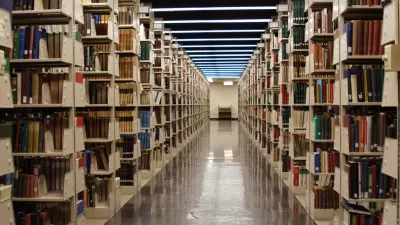I’ve had a lot of students ask me recently about who should write a letter of reference as they apply to graduate school. I have a policy on my own web site stating when I will write a letter but there are more general principles that hold across many faculty members and programs.
I've had a lot of students ask me recently about who should write a letter of reference as they apply to graduate school. I have a policy on my own web site stating when I will write a letter but there are more general principles that hold across many faculty members and programs.
Try to get someone who has graduated with the same type of degree as the one you wish to study. Having two engineers or two architects recommend you for planning can backfire as they may not have a clear understanding of the field. If you need to have people from outside the field, prepare them to say why they think you would be a good planner. If you are applying to a PhD make sure most of your letter writers have that degree and anyone who doesn't should be there for a very good reason.
Ask people who know you well enough to be specific in their letters. On my web site I state my need for multiple interactions. Something like this is really a general principle. Without such interactions letter writers must resort to generalities. General or vague letters may, however, suggest that the applicant has problems that the reference writer does not want to talk about. I just can't write a good letter unless I know an applicant well so I am not doing them a good service if I attempt it.
Obtaining letters from people who are personally recognizable to other professors can be useful, but it is much more useful to have a letter from someone who knows you well. If a famous person will provide only a few general sentences, it is typically not worth getting that letter.
However, all letters should come from people who have attained some position of responsibility. Not every letter needs to be from a very senior person but as you balance the two or three letters you typically are allowed to submit, try to get someone who has employed or taught a large number of people so they can provide thoughtful comparisons and a sophisticated assessment of your capacity for graduate school. You might have one letter from someone more junior if they were, for example, your direct supervisor and can provide very specific details about very relevant activities.
If you are an undergraduate, make sure you actively cultivate letter writers. Sometimes undergraduates do a lot of big classes and feel they don't know faculty. This is all the more reason to work before going back to graduate school. You can, however, also be more strategic in selecting classes, so some professors do get to know you better. Try to do some classes with permanent faculty who are likely to stay around a while, and see writing letters of reference as part of their job, rather than part-time faculty who may be hard to locate and unwilling to write. Sign up for office hours and ask advice about graduate work. Make sure these faculty members can talk about you with some familiarity.
If you have been out working for a very long time be strategic. If professors have written for you in the past, they may be able to update that letter. However if that is really ancient history, try to get letters from people who can speak to your aptitude for learning new things, writing, reading, and working in teams. Sometimes you may interact with permanent or adjunct faculty members in a professional context-it may be appropriate to ask them. Overall, make sure your academic aptitude is clear.
If the language of instruction of the degree is not your first language, then a letter from someone fluent in that language and attesting to your skills can sometimes help. One of your main letters might come from someone fluent in your proposed study language and if so it is helpful if they comment on your language abilities. If not, and particularly if your test scores in that language are not stellar, having a short letter from a professional in the field who is fluent in your study language can be useful. This is not essential however, and if you are only allowed two letters in my opinion they should focus on your professional potential.
If the country of your first degree is not the same as the one where you propose to do graduate work, try to get at least one letter from someone who understands the system in the country where you will study. It helps admissions committees when letter writers refer to their experience studying or visiting abroad, their specific understanding of the strengths of the program you wish to study in, and provide their assessment of how you will fit. You may need to help your letter writers with this preparation.
Again, remember to thank those who write letters for you as they have done a lot of work.
Previously I have written about a number of aspects of graduate applications. For links to relevant entries see: http://www.annforsyth.net/forstudents.html#Advice

Manufactured Crisis: Losing the Nation’s Largest Source of Unsubsidized Affordable Housing
Manufactured housing communities have long been an affordable housing option for millions of people living in the U.S., but that affordability is disappearing rapidly. How did we get here?

Americans May Be Stuck — But Why?
Americans are moving a lot less than they once did, and that is a problem. While Yoni Applebaum, in his highly-publicized article Stuck, gets the reasons badly wrong, it's still important to ask: why are we moving so much less than before?

Using Old Oil and Gas Wells for Green Energy Storage
Penn State researchers have found that repurposing abandoned oil and gas wells for geothermal-assisted compressed-air energy storage can boost efficiency, reduce environmental risks, and support clean energy and job transitions.

Minneapolis Bans Rent-Setting Software
Four cities have enacted restrictions on algorithmic software that can inflate rent costs.

Oakland to Add 244 New EV Chargers
Oakland plans to launch its new charging network at eight locations by the end of 2025.

Jane Goodall Inspires with Message of Hope, Resilience, and Environmental Action
Speaking in Pasadena, Jane Goodall offered a hopeful and inspirational message, urging global compassion, environmental responsibility, and the power of individual action to shape a better future.
Urban Design for Planners 1: Software Tools
This six-course series explores essential urban design concepts using open source software and equips planners with the tools they need to participate fully in the urban design process.
Planning for Universal Design
Learn the tools for implementing Universal Design in planning regulations.
Heyer Gruel & Associates PA
City of Moreno Valley
Institute for Housing and Urban Development Studies (IHS)
City of Grandview
Harvard GSD Executive Education
Salt Lake City
NYU Wagner Graduate School of Public Service
City of Cambridge, Maryland






























